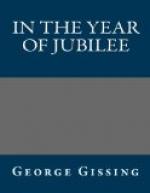’Father is quite right. Your place is with us. I am glad, very glad.’
Mary looked from Mr. Lord to his daughter, tried vainly to speak, and left the room.
CHAPTER 2
His father’s contemptuous wrath had an ill effect upon Horace. Of an amiable disposition, and without independence of character, he might have been guided by a judicious parent through all the perils of his calf-love for Fanny French; thrown upon his own feeble resources, he regarded himself as a victim of the traditional struggle between prosaic age and nobly passionate youth, and resolved at all hazards to follow the heroic course—which meant, first of all, a cold taciturnity towards his father, and, as to his future conduct, a total disregard of the domestic restraints which he had hitherto accepted. In a day or two he sat down and wrote his father a long letter, of small merit as a composition, and otherwise illustrating the profitless nature of the education for which Stephen Lord had hopefully paid. It began with a declaration of rights. He was a man; he could no longer submit to childish trammels. A man must not be put to inconvenience by the necessity of coming home at early hours. A man could not brook cross-examination on the subject of his intimacies, his expenditure, and so forth. Above all, a man was answerable to no one but himself for his relations with the other sex, for the sacred hopes he cherished, for his emotions and aspirations which transcended even a man’s vocabulary.—With much more of like tenor.
To this epistle, delivered by post, Mr. Lord made no answer.
Horace flattered himself that he had gained a victory. There was nothing like ‘firmness,’ and that evening, about nine, he went to De Crespigny Park. As usual, he had to ring the bell two or three times before any one came; the lively notes of a piano sounded from the drawing-room, intimating, no doubt, that Mrs. Peachey had guests. The door at length opened, and he bade the servant let Miss. Fanny know that he was here; he would wait in the dining-room.
It was not yet dark, but objects could only just be distinguished; the gloom supplied Horace with a suggestion at which he laughed to himself. He had laid down his hat and cane, when a voice surprised him.
‘Who’s that?’ asked some one from the back of the room.
’Oh, are you there, Mr. Peachey?—I’ve come to see Fanny. I didn’t care to go among the people.’
‘All right. We’d better light the gas.’
With annoyance, Horace saw the master of the house come forward, and strike a match. Remains of dinner were still on the table. The two exchanged glances.
‘How is your father?’ Peachey inquired. He had a dull, depressed look, and moved languidly to draw down the blind.
’Oh, he isn’t quite up to the mark. But it’s nothing serious, I think.’




